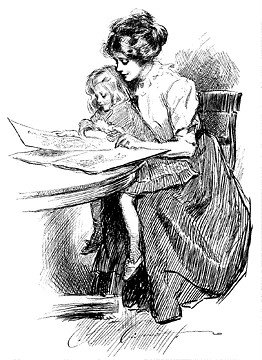Of all those acquirements which more particularly belong to the female character there are none which take a higher rank, in our estimation, than such as enter into a knowledge of household duties; for on these are perpetually dependent the happiness, comfort and well-being of a family. In this opinion we are borne out by the author of 'The Vicar of Wakefield' who says: the modest virgin, the prudent wife, and the careful matron, are much more serviceable in life than petticoated philosophers, blustering heroines, or virago queans (sic). She who makes her husband and her children happy, who reclaims the one from vice and trains up the other to virtue, is a much greater character than ladies described in romances, whose whole occupation is to murder mankind with shafts from their quiver, or their eyes...
Good Temper should be cultivated by every mistress, as upon it the welfare of the household maybe said to turn; indeed its influence can hardly be over-estimated, as it has the effect of moulding the characters of those around her, and of acting most beneficially on the happiness of the domestic circle. Every head of a household should strive to be cheerful, and should never fail to show a deep interest in all that appertains to the well-being of those who claim the protection of her roof. From The Book of Household Management: With a History of the Origin, Properties, and Uses of all things connected with Home Life and Comfort, by Mrs. Beeton (1869).
So - no philosophy, no arguing, no whining, no nagging. Be happy with the status quo. Got it? But if you want to read more of Mrs. Beeton's famous Book of Household Management, check out this site on the Ideals of Womanhood in Victorian Britain.
This was the standard advice for marriage in the mid-19th century, and some women (and not just "surendered wives") still think that's the way to go. I didn't go into it in my last post on Happy Housewives, but there's a lot in this just published book about how you should admire your husband, respect your husband, stop nagging, stop whining, get a good attitude and be grateful for what you have.
The phrase "petticoated philosophers" in Mrs. Beeton rang a bell with me - there is a fascinating history (in the US and Great Britain, anyway) of using "petticoats" to describe anything female in a disparaging manner. So for the last few centuries, at least, there were many popular references to "petticoat government" - both in terms of households 'unnaturally' ruled by women, and for different cultures (like the 18th century Cherokee), where women took an active part in politics and had a lot of personal autonomy.
Petticoatery shouldn't be confused with pettifoggery, although they both do share that diminutive prefix. But I don't want to be petty, so I'll stop here. Really, who wears the pants* in your house, anyway?
*or trousers, or breeches
Warning: Don't google petticoats unless you want to learn a lot about the cross-dressing habits of some British men. It's almost as scary as when I was pregnant and looked for cloth diapers for my baby on the internet.

2 comments:
I do like the sound of "virago quean", though...it would make a good blog title, wouldn't it?
I forgot to mention that "Petticoat Junction" must fit in here somehow ;-)
Post a Comment